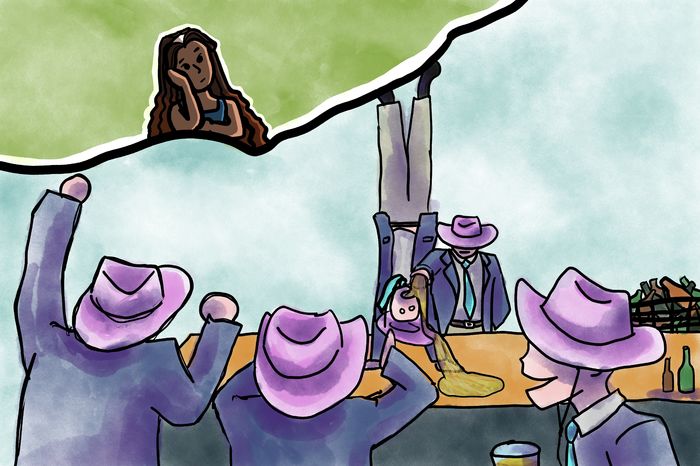How do I write about street safety?
Eliza Ousey writes about the difficulties facing women in public places, and the difficulties of writing about them

This week, I have attempted to write up an article about street safety, specifically about a BBC report which found that the ‘Ask for Angela’ scheme was not being properly instated in pubs. I thought I would know what to say. Partly because of the US election, and partly because of the Tragedy paper, I’ve spent a lot of time recently reading about male violence and misogyny. It’s also become a running joke that every essay I write ends up being about women (see: ‘Clytemnestra Did Nothing Wrong’, ‘Medea: A Queer Icon? ’, and ‘Alison Bechdel on Oedipus’). A Varsity article on the subject seemed easy enough. I set aside a few hours, more than enough time.
I couldn’t write it. Every potential headline seemed contrived: ‘The patriarchy is bad, says Eliza Ousey’, ‘I don’t like being followed home, comments Eliza Ousey’, ’Eliza Ousey argues that we probably should know who Angela is’. Each draft seemed patronising, or oversimplified, or a bit daft. It sounded like I was trying to explain misogyny back to women. Even when I leant into my own experience, it read like I was trying to cast quite typical occurrences as unique or unheard of. My poor girlfriend – sloughing through Anki flashcards about bovine TB – kindly sat through my long existential crisis, about how difficult writing was. Writing about misogyny, in any capacity, suddenly felt quite specifically tricky.
I can only talk from my own experience, but I’ve found Cambridge, particularly in student areas, to be a relatively safe place. I haven’t (thank God) had any majorly awful experiences, nor do I often find myself in imminent danger. And yet, when I find myself out after dark, which at the moment is after about 4pm, my heart rate goes up and my cortisol levels soar. Often, being nervous feels kind of irrational, and I feel unfair for being scared of the men I walk past.
“It sounded like I was trying to explain misogyny back to women”
I think this is why I found it tricky to write about. I didn’t want to make the situation seem worse than I’ve found it, but, conversely, an article that said ‘I feel scared, but I don’t know why’ didn’t seem to pack much of a punch. I knew that there was something in my experience that would be relatable, that there was something to say, but I couldn’t tell what it was.
The reality is that I go out at night with the knowledge that a risk exists - however small - and that is enough to scare me. I go out remembering experiences outside of Cambridge, of when, at 17, a guy chased me down the street, shouting “I’m not a threat!” He was offended that I looked scared at him, and decided to change that: by being incredibly scary. I remember how terrifying it was when, for a split second, my legs turned to lead and I couldn’t run. I also remember a group of men who watched outside the pub and did not respond. Nothing like this has ever happened to me at uni, but the thought that it could do remains.
“It is like walking through a field that you are 80 percent sure doesn’t have a bomb buried in it”
This limbo that women experience – between the knowledge that things will probably be fine, but the potentiality that they won’t be – is oppressive. It is like walking through a field that you are 80 percent sure doesn’t have a bomb buried in it. It is incredibly stressful. The horrible predicament is that, in this minefield, you have to have a certain suspicion of men you pass, or you are putting yourself at an active risk. These assumptions feel unfair, but in the moment they have to be made. Obviously, this limbo isn’t as dire as feeling genuinely threatened (I’d like to make that very clear), but it does remain a bit rubbish to experience every time you leave the house.
I think I was quite scared to admit that. Extreme misogyny is on the rise. Violence against women and girls has risen 37% since 2018 (and that’s only “reported offences”), abortion is under attack in the US, and their incoming president boasts about grabbing women ‘by the p*ssy’. In Afghanistan, women aren’t allowed to talk in public, show their faces, or attend school after a certain age. A lot of things are really, really bad, and ‘feeling a bit scared sometimes’ pales in comparison. But it remains important to say: research by the University of Nottingham found that 93.7% of women had experienced street harassment, and 74.9% said it had a long term impact on them. If we stop admitting when things are, in my own words, ‘a bit rubbish’, we allow them to continue, and get worse.
 Features / Beyond reality checkpoint: local businesses risking being forced out by Cambridge’s tourism industry15 October 2025
Features / Beyond reality checkpoint: local businesses risking being forced out by Cambridge’s tourism industry15 October 2025 Comment / Bonnie Blue is the enemy, not the face, of female liberation13 October 2025
Comment / Bonnie Blue is the enemy, not the face, of female liberation13 October 2025 News / Cambridge climbs to third in world Uni rankings11 October 2025
News / Cambridge climbs to third in world Uni rankings11 October 2025 News / Join Varsity this Michaelmas13 October 2025
News / Join Varsity this Michaelmas13 October 2025 Features / How to spend a Cambridge summer12 October 2025
Features / How to spend a Cambridge summer12 October 2025










